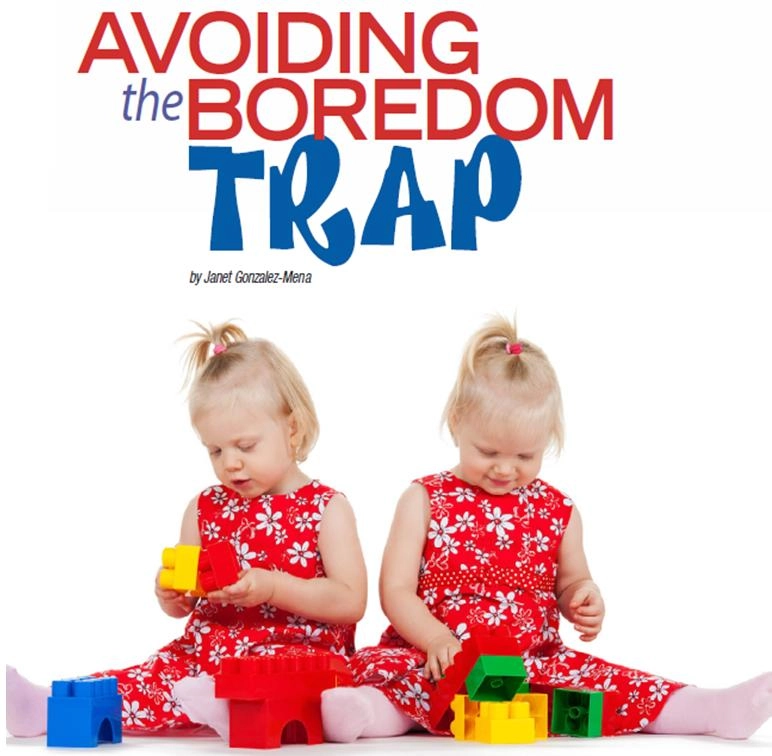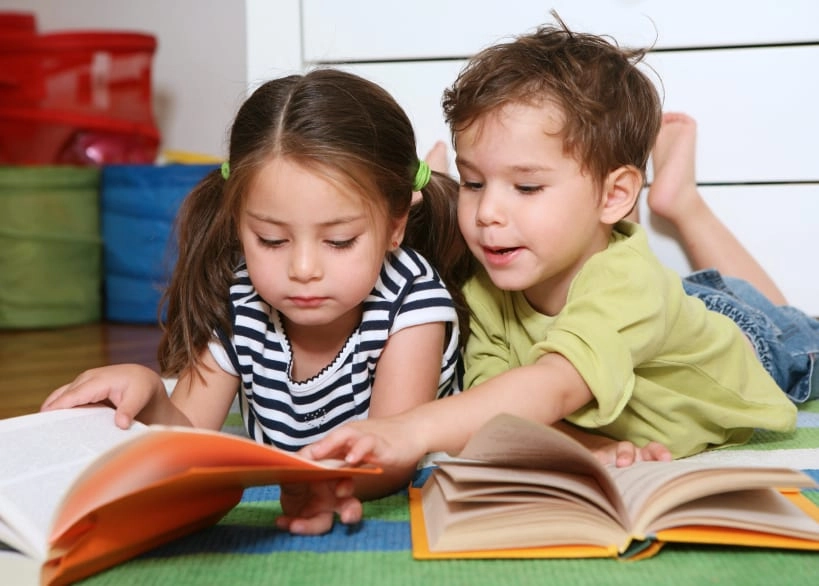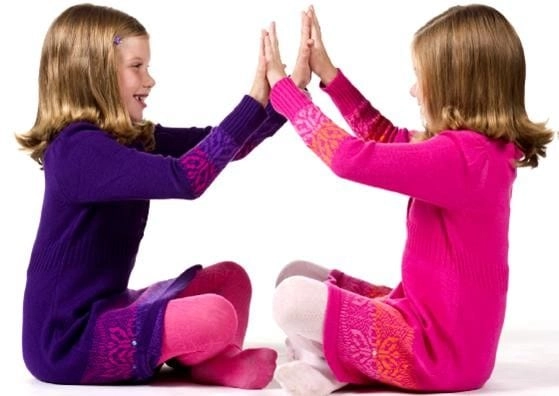By Janet Gonzalez-Mena
Bored teens are a problem in this country? Talk to any group of folks concerned with adolescents, and you’ll hear that a lot of the bad things happen because many teens have nothing to do. They’re bored so they get into trouble.
So, what do bored teenagers have to do with toddler twins? Boredom prevention starts early. It begins when parents clearly distinguish their own needs and perceptions from those of their children.
Boredom Breeds Early
Here’s an all too common scenario. A new parent peers over the side of the crib and sees a baby lying there unable to walk, talk or even lift its head. The parent imagines how it must feel to be so helpless. If the adult had just to lie there, he or she would feel bored. Therefore, the adult figures, the baby must feel the same.
The solution seems simple enough: entertain the baby. At the slightest whimper parents pick up their babies and carry them around. Or they may buy bunches of crib toys designed to entertain. They dangle things in front of their babies—things that make noise and move. And they prop their babies up in front of the TV.
What the parents don’t realize is that babies have keen senses and a whole new world to explore. They don’t need to do much except lie around and take everything in. Boredom is not a problem for babies. It’s a problem for adults.
Creating whiners
Multiples especially have an infinite variety of things to observe because they have each other. And it’s not just human life that’s interesting to them. The whisper of a breeze and the flutter of a curtain at a window provide a world of wonder.
When adults entertain babies rather than appreciating their need for lying around, they teach babies to be dissatisfied with life’s little pleasures. Children learn in a hurry that just a little whimper can summon mom or dad to liven things up.
When this happens, babies stop observing curtains and listening to the wind. They forget that they have the capability of creating their own activity. They get hooked on more sophisticated entertainment. Then, when this entertainment stops, they whine and fuss, validating their parents’ original assumption.
This problem creeps right into toddlerhood. Some parents are so used to keeping their babies entertained that they don’t let up when the little ones get up on their feet.
Instead, they liven up their entertainment acts, provide more sophisticated toys, and turn the TV on more often, adding video tapes and finally computer and video games. None of these things: toys, TV, computer r video games, are problems in themselves. The problems come from adult perception that children don’t have ability to find self-satisfying ways to spend their time.
I’ve noticed that children who can easily create their own activities are those who watch little or no TV, have a reasonable number of toys, an environment set up for them to play and parents who assume their kids can figure out things to do on their own.
Let Kids Entertain Themselves
It’s not that those children who think up their own activities don’t ever get bored. All children get bored sometimes, but boredom serves a function.
It provides an incentive for children to pursue new interest and create new activities. When parents see that their children are truly bored (not just bored in the mind of the parent) it’s better to give them space and time to think up something to do rather than jumping in and fixing the problem for them.
I’m not trying to make parents feel guilty. Instead, I’m trying to look at a widespread problem that seems to worsen every year. It isn’t anybody’s fault. After all, we want the best for our children. However, most of us were influenced by the push for early stimulation.
We bought into the message that it’s a parent’s job to be sure children have plenty to do. I’m not exception. I know firsthand about the tendencies we all have to entertain our children and keep them happy. Part of the problem is that, as a society, we see childhood as a period that should be free from burdens, so we don’t require youngsters to take part in any of the work of creating and maintaining the home or the community beyond.
As a result they spend their childhood seeking entertainment. But when they run out of entertainment, they complain or get into trouble.
Toddlerhood is the perfect time to start teaching children to help out around the house. Two-year-olds like to do “grown-up things” if given the chance.
Of course, they don’t have adult skills but can learn them through seeing that their involvement is part of keeping the house in order. Now, we don’t want to overburden toddlers with too much responsibility. Childhood should be fun. It’s fine to play with toddlers and buy them toys.
The issue is overindulgence. You can tell you’ve gone too far when children come to expect to be entertained and forget how to keep themselves’ occupied.
Janet Gonzalez-Mena of Napa, California, teaches early childhood education at Napa Valley College. She is author of the book Dragon Mom and the mother of five children.





